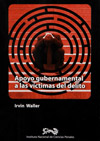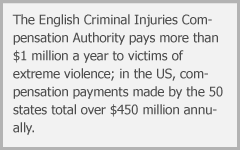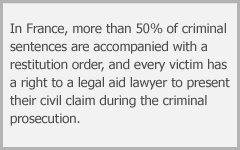 This has become a seminal study of the impact of incarceration on the lives of more than 400 men released from prison. It showed the limited effect of parole supervision on the lives of these men and the inevitability of recidivism given the life experiences with which inmates entered prison. It also showed the critical importance of a strong relationship, a job and an ability to control fighting and drinking. This book provided an evidence base for correctional reform and is still quoted on the Corrections Service of Canada website. It was the high rates of recidivism (which are still present today when researchers undertake proper follow-up) that started Waller thinking about prevention and needs of victims.
This has become a seminal study of the impact of incarceration on the lives of more than 400 men released from prison. It showed the limited effect of parole supervision on the lives of these men and the inevitability of recidivism given the life experiences with which inmates entered prison. It also showed the critical importance of a strong relationship, a job and an ability to control fighting and drinking. This book provided an evidence base for correctional reform and is still quoted on the Corrections Service of Canada website. It was the high rates of recidivism (which are still present today when researchers undertake proper follow-up) that started Waller thinking about prevention and needs of victims.
 He was a pioneer and advocate to get the UN General Assembly to adopt the Resolution on reducing crime and advancing the Declaration on Basic Principles of Justice for Victims of Crime and Abuse of power, a crime victims bill of rights.
He was a pioneer and advocate to get the UN General Assembly to adopt the Resolution on reducing crime and advancing the Declaration on Basic Principles of Justice for Victims of Crime and Abuse of power, a crime victims bill of rights.








 This pioneering monograph reported on the first victimization survey in Canada that was used to identify how to prevent residential burglary and meet the needs of crime victims. It confirmed that burglary could be prevented if the causes were tackled. It showed that victims had needs that would be met much better in most cases through programs other than incarceration of the offender. It dispelled the myth that all victims want is punishment. It was this study that brought Waller into the international movement to get services and rights for victims of crime. Several of the questions developed for this survey are now paralleled in the British Crime Survey.
This pioneering monograph reported on the first victimization survey in Canada that was used to identify how to prevent residential burglary and meet the needs of crime victims. It confirmed that burglary could be prevented if the causes were tackled. It showed that victims had needs that would be met much better in most cases through programs other than incarceration of the offender. It dispelled the myth that all victims want is punishment. It was this study that brought Waller into the international movement to get services and rights for victims of crime. Several of the questions developed for this survey are now paralleled in the British Crime Survey. This has become a seminal study of the impact of incarceration on the lives of more than 400 men released from prison. It showed the limited effect of parole supervision on the lives of these men and the inevitability of recidivism given the life experiences with which inmates entered prison. It also showed the critical importance of a strong relationship, a job and an ability to control fighting and drinking. This book provided an evidence base for correctional reform and is still quoted on the Corrections Service of Canada website. It was the high rates of recidivism (which are still present today when researchers undertake proper follow-up) that started Waller thinking about prevention and needs of victims.
This has become a seminal study of the impact of incarceration on the lives of more than 400 men released from prison. It showed the limited effect of parole supervision on the lives of these men and the inevitability of recidivism given the life experiences with which inmates entered prison. It also showed the critical importance of a strong relationship, a job and an ability to control fighting and drinking. This book provided an evidence base for correctional reform and is still quoted on the Corrections Service of Canada website. It was the high rates of recidivism (which are still present today when researchers undertake proper follow-up) that started Waller thinking about prevention and needs of victims.









